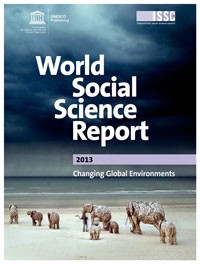This is one of a series of Stories of Change from the ESRC STEPS Centre.
The story of how STEPS intervened in global debates around visions and plans for sustainability, from Rio+20 to the Sustainable Development Goals.
In 2015, a new set of 17 Sustainable Development Goals were formally adopted by members of the United Nations. Together they offer a brave vision for all of humanity, ‘leaving no-one behind’.
The goals apply explicitly to all countries, not just ‘developing’ ones. And while each goals refers to a specific area, there is much emphasis on how they connect together.
From the Rio+20 conference in 2012 onwards, the STEPS Centre and partners have galvanised expertise and experience to engage with the process of formulating the Sustainable Development Goals. For example, the Centre was active at the Planet Under Pressure conference, an important stepping stone on the way to Rio.

The STEPS Centre submitted a position paper to the Rio+20 zero draft preparation process, in which it argued that science, technology and innovation have essential roles to play in sustainability; but innovation should give recognition and power to poorer people. Melissa Leach as STEPS co-director attended the conference, and presented at a variety of events, including the High-level Dialogue on Global Sustainability: Tipping the scales towards sustainability — The Future We Choose.
Meanwhile, the Centre led a series of articles in The Guardian profiling our research — both from individual projects/domains, and across the Centre:
- It’s time for sustainable development
- Why Rio+20 must not leave the politics out of sustainable development
- Edge of sustainability: why Rio+20 mustn’t ignore people on city fringe
- Rio+20 must make inclusive innovation stepping stone to a sustainable future
- Achieving universal energy access
Transforming innovation
Together with our colleagues at the Stockholm Resilience Centre (which later joined the STEPS Global Consortium), we collectively prepared a paper linking SRC and STEPS ideas in new and productive ways. This was published in the journal Ecology and Society and was widely shared at Rio.

The World Social Science Report 2013 featured an article by Melissa Leach, Johan Rockström and Kate Raworth that brought together ideas about planetary boundaries informed by questions of social wellbeing and justice.
As in Kate Raworth’s book, Doughnut Economics, which she shared early ideas on at the 2013 STEPS Summer School and later at our 2015 annual lecture, connecting social, economic, political and ecological dimensions in thinking about sustainability is essential.
Highlighted in an IDS briefing, STEPS Centre work presented a distinctive perspective on innovation and sustainability at a turning point for global collective action on development, by working with high profile and influential partners and networks, and through the media to maximise our contribution to the debate.

How can the global goals transform development?
Following Rio, the Centre was able to contribute widely to the debates around the SDGs, arguing strongly that the challenge was to think of these as a political platform for transformation, not one where a UN/governmental system got bogged down in goals and targets.
This meant, as with all STEPS work, politics had to be central to sustainable development. Making this case, we published a series of articles in the Huffington Post, as part of a commissioned special feature on the SDGs around their launch in 2015.
- Gender should be part of the conversation across *all* SDGs
- Rethinking Africa’s sustainable development pathways
- Giving flesh to the science and innovation we need to see
- Science, politics and the post-Rio+20 agenda
In addition, STEPS members contributed to various parliamentary inquiries in the UK framed by SDG concerns in this period.
In the same year, gender equality was the focus of a new book edited by Melissa Leach, published in the Pathways to Sustainability series. The book explains the complex interactions between gender relations and sustainability, and calls for more attention to policies, investments and initiatives in sustainable development that recognize women’s knowledge, agency and decision-making as fundamental.
In 2016, wanting to take stock a year and half on, together with the Independent Expert Group for the Least Developed Countries (LDCs) and the International Institute for Environment and Development (IIED), we co-hosted a meeting in London to reflect on progress and challenges around the SDGs. A summary of the event gives links to papers, interviews and other materials.
[embedyt] https://www.youtube.com/embed?listType=playlist&list=PL1iUHL94bWo52q0L4L38A80J_3Rl2qB0G&v=XLzSBIg0PR0[/embedyt]
Interviews with participants in the IEG/IIED/STEPS event on SDGs in Low Income Countries (YouTube)





Implementing the new global goals
The STEPS Annual Lecture in 2017 was given by incoming director of UNDP and former director of UNEP, Achim Steiner. In his talk, he focused on what is involved in the task of implementing the SDGs, provoking interesting debate around the challenges of multilateralism today.
Achim Steiner pointed out the close connection between the launch of the SDGs and the Paris Agreement on climate change. Despite the rise of authoritarian nationalism in some countries, he suggested, this was evidence that many nations still saw the benefits of working together. The SDGs and the Paris Agreement were a unique moment for global action on the environment.
In 2019, STEPS director Ian Scoones returned to the topic in a Sussex Development Lecture, reviewing how countries and institutions had met the challenge so far. He challenged the ‘piece-meal, sectoral approach’ adopted by some, and called for a more radical vision of transformatory change, putting power and politics centre-stage.





Towards 2030
STEPS Centre work continued to engage in academic and public debates around implementing the SDGs, including a critical celebration of 75 years of the United Nations in 2020.
It is crucial to show how the goals can be more than a box-ticking exercise, but instead offer opportunities for new debates and new alliances to form. They remind us how the achievement of any goal depends on success in the others.
The SDGs importantly also remind us that sustainable development, as a global effort, should neither be thought of as a burden for poorer countries, or an indulgence for the rich. It’s a universal responsibility for everyone — and that means facing up to the historical inequalities, injustices and power relations between communities and countries.
Any transformative action towards achieving the goals will meet with resistance, contestation, and politics as it becomes clear who the winners and losers might be. Confronting these political issues is just as important as overcoming the technical and scientific challenges of sustainable development.
Find out more
Browse our archive of material about the Sustainable Development Goals.





Stories of Change
From 2006-2021, the ESRC STEPS Centre explored pathways to sustainability – showing the important roles that marginalised ideas, knowledge and forms of action could play in responding to complex social, technological and environmental challenges.
In this process, we were involved in many process of change, from local struggles to high-level international debates. These Stories of Change explore some key themes from STEPS work, to share what we learned.
